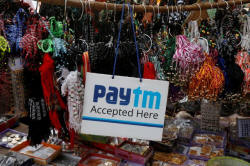U.S. firms face off with Indian rival in lobbying
against data storage rules
 Send a link to a friend
Send a link to a friend
 [July 24, 2018]
By Aditya Kalra and Aditi Shah [July 24, 2018]
By Aditya Kalra and Aditi Shah
NEW DELHI (Reuters) - U.S. payment firms
have successfully pushed India to consider diluting rules on data
storage, but their lobbying campaign has sparked a bitter industry spat
pitting them against local rival Paytm, according to sources and
documents seen by Reuters.
India's central bank in April directed payment firms to store data
locally for "unfettered supervisory access" - a move companies such as
Visa, Mastercard and American Express fear would cost millions of
dollars and hamper global fraud detection.
But the rules give a competitive advantage to Paytm, backed by Japan's
Softbank Group and China's Alibaba, which already stores all its data in
India. The company has publicly supported the proposal and, behind
closed doors, tried to thwart efforts of those opposing them.
In a meeting between officials and industry representatives in June,
chaired by India's economic affairs secretary S.C. Garg, Paytm argued
with foreign company executives on the benefits of storing data locally
and said the rules were in the national interest, three people with
knowledge of the discussions said.

Garg told Paytm not to bring the national interest into a debate around
data storage, the sources said. Garg did not respond to a request for
comment.
Separately, in May, Paytm privately objected to lobby group Payments
Council of India (PCI), which wanted to tell the central bank that
"most" of its members had some concerns with the proposal, e-mails seen
by Reuters showed.
Paytm's spokeswoman Sonia Dhawan did not comment on Reuters queries
about the government meeting, but said "for the benefit of the country
and to uphold the need for data privacy, all the data related to the
Indian users must be stored and processed" only in the country.
"There is absolutely no need for the data of two Indians doing
transactions in India to be shared or stored overseas," she said.
The tussle between Paytm and other companies highlights the fierce
competition that has gripped India's crowded digital payments market
which, according to Boston Consulting Group and Google, is expected to
grow tenfold to $500 billion by 2020.
Paytm, with its mobile wallet app, has cashed in on the boom by
partnering with Indian merchants for payments, eroding dominance of card
firms such as Mastercard and Visa.
Neil Shah, research director at Counterpoint Research, said Paytm's
"cross-lobbying" to push for implementation of the new rules made
complete business sense as that would force foreign companies to focus
on compliance, instead of growth.
"Pressure on foreign firms could have implications on their existing
strategies," said Shah. "It can derail them a bit, basically".
Digital payments and use of cards in India has soared since November
2016, when Prime Minister Narendra Modi announced a sudden ban on
existing high-value currency notes and started pushing digital payments.
Indians in May clocked transactions worth $52 billion using their 964
million credit and debit cards, nearly double the amount recorded back
in November 2016. Monthly mobile-wallet payments have risen nearly
fivefold to $2 billion during the period, data from the Reserve Bank of
India (RBI) showed.
[to top of second column] |

An advertisement of Paytm, a digital wallet company, is pictured at
a road side stall in Kolkata, India, January 25, 2017. REUTERS/Rupak
De Chowdhuri/File photo

DIGITAL BOOM, LOBBYING FIGHT
India's digital boom has prompted Facebook's WhatsApp messenger to test an
interbank money transfer service in India, while Google also launched a payments
app last year to compete with local players.
The RBI in April said payments data should be stored "only in India" within six
months for "safety and security". But U.S. firms protested and India's finance
ministry in June recommended relaxing the directive, according to minutes of a
government meeting seen by Reuters.
The RBI plans to issue a "clarificatory circular" to address concerns related to
its rules, the minutes showed. RBI did not respond to a request for comment.
The April announcement provoked a vigorous industry lobbying effort, some of
which pitted Paytm against the rest.
That month, the Payments Council of India (PCI), which counts Paytm as well as
U.S. payment companies among its members, started working on a draft listing
concerns it had with rules, e-mails exchanged between industry executives
showed.
Most of its member companies, PCI said in its initial drafts, had "some
concerns" with the RBI's directive.
Paytm objected.
In one e-mail to the industry, which was copied to various executives including
from Facebook, Google and three U.S. card companies, Paytm's Dhawan asked for
the company's views to be included.
Paytm's representation, seen by Reuters, said it "fully supports the RBI
mandate" and that the central bank's timeline of six months "should be adhered
to by all".
"You should not submit the document with RBI," Dhawan wrote on May 6, referring
to the draft as a "one-sided view".

Dhawan declined to comment on her e-mails to PCI members, citing
confidentiality.
PCI later submitted a letter to the RBI saying it had received "divided"
responses from its members - a shift from its original stance when it was saying
"most" of its members had some concerns.
PCI's then chairman Naveen Surya declined to comment. Subho Ray, President of
Internet and Mobile Association of India which counts PCI as one of its
committees, said he would not comment on "internal communications".
(Reporting by Aditya Kalra and Aditi Shah; Editing by Alex Richardson)
[© 2018 Thomson Reuters. All rights
reserved.] Copyright 2018 Reuters. All rights reserved. This material may not be published,
broadcast, rewritten or redistributed.
Thompson Reuters is solely responsible for this content. |